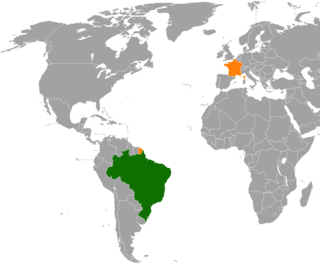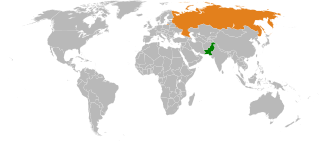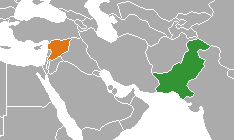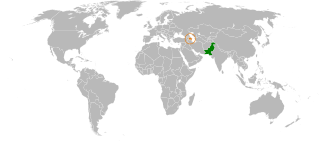| Diplomatic agrément/Diplomatic accreditation | Ambassador | Observations | Presidents and/or prime ministers of Pakistan | Prime ministers of France | Term end |
|---|
|
| November 24, 1950 | {{{2}}}, Muhammad Nawaz Khan (diplomat) Muhammad Nawaz Khan (diplomat) | | {{{2}}}, Khawaja Nazimuddin Khawaja Nazimuddin | {{{2}}}, Vincent Auriol Vincent Auriol | |
| March 15, 1952 | {{{2}}}, Habib Ibrahim Rahimtoola Habib Ibrahim Rahimtoola | | {{{2}}}, Malik Ghulam Muhammad Malik Ghulam Muhammad | {{{2}}}, Vincent Auriol Vincent Auriol | |
| October 13, 1953 | {{{2}}}, Mohammed Ikramullah Mohammed Ikramullah | | {{{2}}}, Malik Ghulam Muhammad Malik Ghulam Muhammad | {{{2}}}, Vincent Auriol Vincent Auriol | |
| April 5, 1957 | {{{2}}}, Mohammad Mir Khan Mohammad Mir Khan | | {{{2}}}, Iskander Mirza Iskander Mirza | {{{2}}}, René Coty René Coty | |
| March 10, 1960 | Raza , Nawabzada Agha Mohammad Nawabzada Agha Mohammad Raza | (born 14.5 1905) graduated from Royal Military College Sandhurst 1927, Ambassador to Iran since February 1955, Ambassador to China 1951-1954 & 22.8.1962-1966; as Pakistan's Ambassador to Mongolia, in 1965.22 October 1971 - 22 April 1972: Pakistan Ambassador to the United States | {{{2}}}, Ayub Khan (Field Marshal) Ayub Khan (Field Marshal) | {{{2}}}, Charles de Gaulle Charles de Gaulle | |
| December 21, 1962 | {{{2}}}, Jalaludin Abdur Rahim Jalaludin Abdur Rahim | (جلال الدين عبدرالرحيم) | {{{2}}}, Ayub Khan (Field Marshal) Ayub Khan (Field Marshal) | {{{2}}}, Charles de Gaulle Charles de Gaulle | |
| September 17, 1966 | {{{2}}}, Ikbal Athar Ikbal Athar | | {{{2}}}, Ayub Khan (Field Marshal) Ayub Khan (Field Marshal) | {{{2}}}, Charles de Gaulle Charles de Gaulle | |
| November 22, 1968 | {{{2}}}, Samiulla Khan Dehlavi Samiulla Khan Dehlavi | | {{{2}}}, Ayub Khan (Field Marshal) Ayub Khan (Field Marshal) | {{{2}}}, Charles de Gaulle Charles de Gaulle | |
| March 24, 1972 | {{{2}}}, Sahabzada Yaqub Khan Sahabzada Yaqub Khan | | {{{2}}}, Zulfikar Ali Bhutto Zulfikar Ali Bhutto | {{{2}}}, Georges Pompidou Georges Pompidou | |
| January 2, 1974 | {{{2}}}, Mahmood Shafqat Mahmood Shafqat | | {{{2}}}, Fazal Ilahi Chaudhry Fazal Ilahi Chaudhry | {{{2}}}, Valéry Giscard d’Estaing Valéry Giscard d’Estaing | |
| April 28, 1976 | {{{2}}}, Muzaffar Ali Khan Qizilbash Muzaffar Ali Khan Qizilbash | | {{{2}}}, Fazal Ilahi Chaudhry Fazal Ilahi Chaudhry | {{{2}}}, Valéry Giscard d’Estaing Valéry Giscard d’Estaing | |
| July 31, 1978 | {{{2}}}, Iqbal Ahmed Akhund Iqbal Ahmed Akhund | | {{{2}}}, Mohammed Zia ul-Haq Mohammed Zia ul-Haq | {{{2}}}, Valéry Giscard d’Estaing Valéry Giscard d’Estaing | |
| November 20, 1980 | {{{2}}}, Sahabzada Yaqub Khan Sahabzada Yaqub Khan | | {{{2}}}, Mohammed Zia ul-Haq Mohammed Zia ul-Haq | {{{2}}}, Valéry Giscard d’Estaing Valéry Giscard d’Estaing | |
| June 18, 1982 | {{{2}}}, Jamsheed Marker Jamsheed Marker | | {{{2}}}, Mohammed Zia ul-Haq Mohammed Zia ul-Haq | {{{2}}}, François Mitterrand François Mitterrand | |
| October 17, 1986 | {{{2}}}, Niaz Ahmed Naik Niaz Ahmed Naik | (born on May 31, 1926; Aug 8, 2009) 11 July 1982 - 30 May 1986 Foreign Secretary (Pakistan) Architect of Pakistans 'track 2 diplomacy with India during the 1999 Kargil conflict, has been tortured and murdered by unidentified persons at his residence here, police said on Saturday. served as Ambassador to Parepun Geneva from 1971 to 1974, Parepun New York from 1978 to 1982 | {{{2}}}, Mohammed Zia ul-Haq Mohammed Zia ul-Haq | {{{2}}}, François Mitterrand François Mitterrand | |
| September 21, 1988 | {{{2}}}, Shahid M. Amin Shahid M. Amin | 1985-1988 Ambassador to Moscow, 1995: Ambassador to Riyadh. | {{{2}}}, Ghulam Ishaq Khan Ghulam Ishaq Khan | {{{2}}}, François Mitterrand François Mitterrand | |
| October 17, 1990 | {{{2}}}, Tanvir Ahmad Khan Tanvir Ahmad Khan | | {{{2}}}, Ghulam Ishaq Khan Ghulam Ishaq Khan | {{{2}}}, François Mitterrand François Mitterrand | |
| January 7, 1992 | {{{2}}}, Saidulla Khan Dehlavi Saidulla Khan Dehlavi | | {{{2}}}, Ghulam Ishaq Khan Ghulam Ishaq Khan | {{{2}}}, François Mitterrand François Mitterrand | |
| May 18, 1999 | {{{2}}}, Shahryar Khan Shahryar Khan | | {{{2}}}, Muhammad Rafiq Tarar Muhammad Rafiq Tarar | {{{2}}}, Jacques Chirac Jacques Chirac | |
| September 4, 2001 | {{{2}}}, Musa Javed Chohan Musa Javed Chohan | (موسی جاوید چوہان) | {{{2}}}, Pervez Musharraf Pervez Musharraf | {{{2}}}, Jacques Chirac Jacques Chirac | |
| November 4, 2003 | {{{2}}}, Aneesuddin Ahmed Aneesuddin Ahmed | (Born on December 11, 1946) January 1993-July 1996: High Commissioner to South Africa July 1996-June 2000 Ambassador to Lebanon. | {{{2}}}, Pervez Musharraf Pervez Musharraf | {{{2}}}, Jacques Chirac Jacques Chirac | |
| April 19, 2007 | {{{2}}}, Asma Anisa Asma Anisa [12] | | {{{2}}}, Pervez Musharraf Pervez Musharraf | {{{2}}}, Nicolas Sarkozy Nicolas Sarkozy | |
| January 15, 2010 | {{{2}}}, Shafkat Saeed Shafkat Saeed | | {{{2}}}, Asif Ali Zardari Asif Ali Zardari | {{{2}}}, Nicolas Sarkozy Nicolas Sarkozy | |
| February 22, 2013 | {{{2}}}, Ghalib Iqbal Ghalib Iqbal [13] | | {{{2}}}, Asif Ali Zardari Asif Ali Zardari | {{{2}}}, François Hollande François Hollande |




















